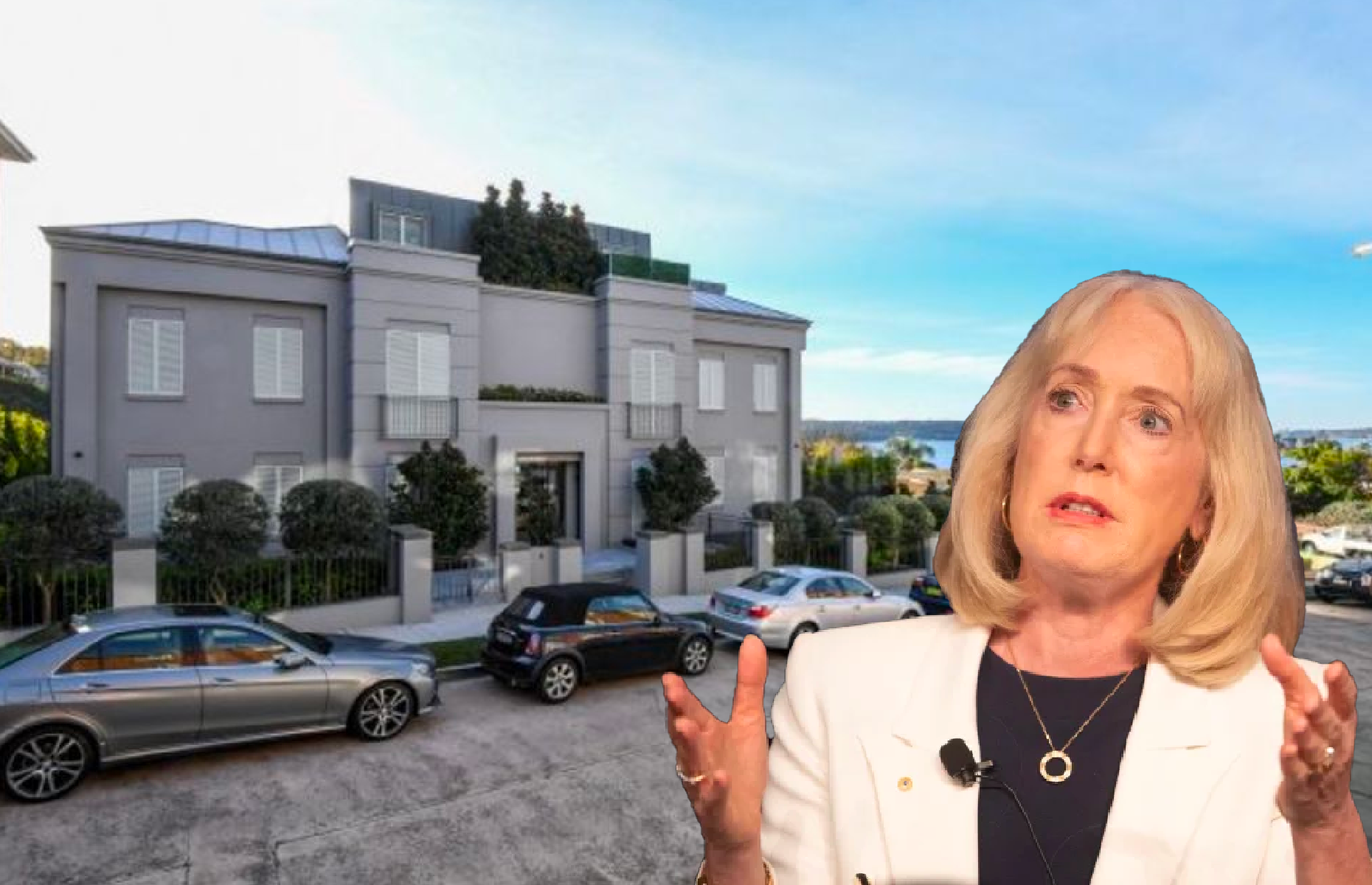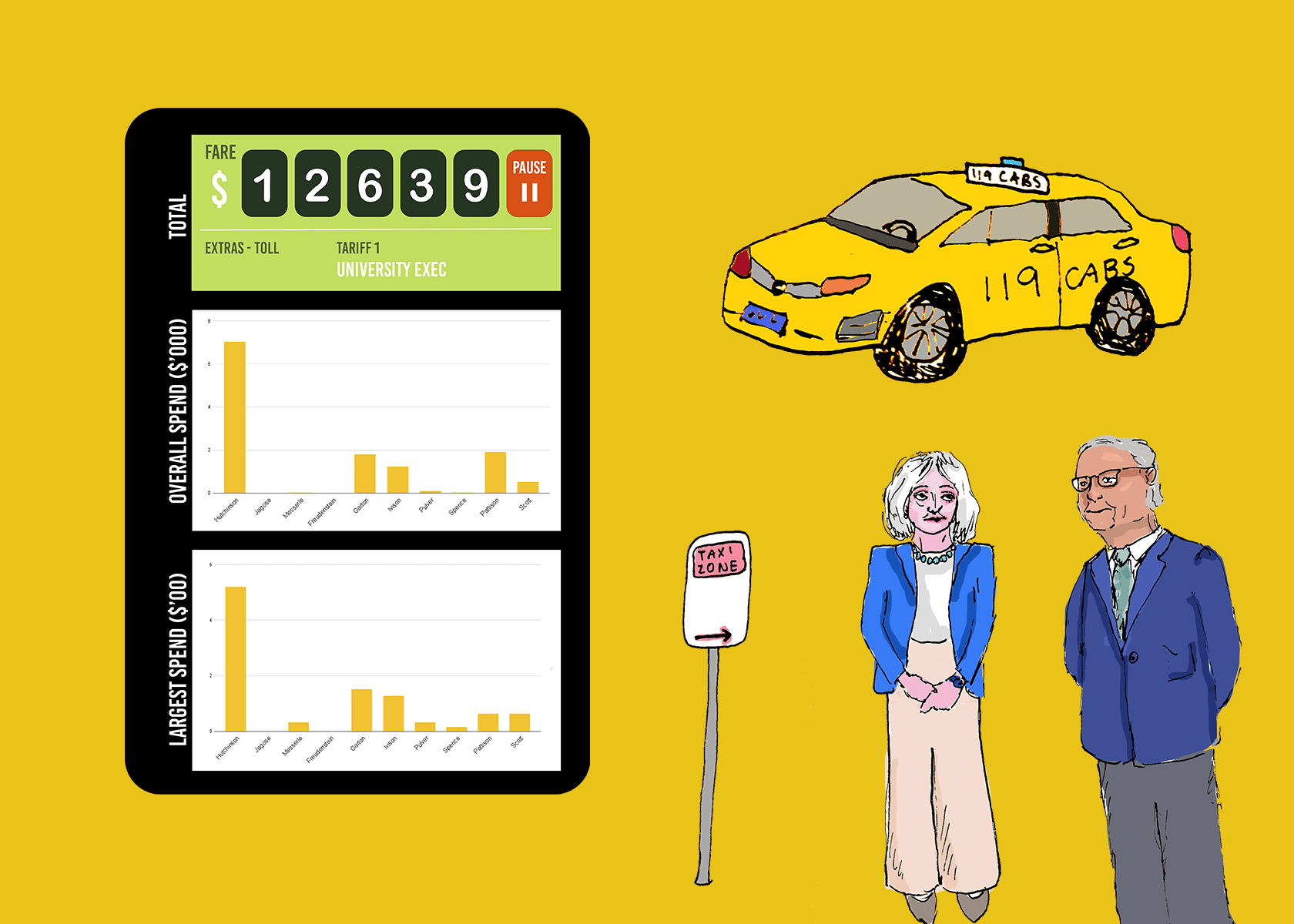Six of The University of Sydney’s top Executives spent $12,639.99 on taxis and Ubers from 1 January 2019 to 31 December 2021. Chancellor Belinda Hutchinson spent more on taxis than any other Executive during this period, expensing $7,045.42 on taxis alone.
USyd policy allows certain staff members to be reimbursed for expenses incurred while executing their duties for the University, subject to a number of conditions. The expense sheets of USyd’s top Executives from 2019 to 2021 were released to Honi under Freedom of Information legislation. They reveal that USyd’s top seven Executives expensed a total of $335,222.78 in this period. Hutchinson’s total expenditure accounting for a total of $16,642.89, with her largest expenditure category being taxis.
Hutchinson’s taxi expenditure was split across 119 separate claims, for an average cost per taxi of $59.20. Notably, Hutchinson spent $519.75 for a single taxi ride dated 11 May 2021, with the cited purpose of “University business”.
Honi asked the Chancellor’s office to explain the nature of this business and why a single taxi ride cost so much, but these queries were ignored.
Instead, a spokesperson for the Chancellor said that “the Chancellor attends many events and meetings for the University, often outside of business hours, and taxis are used to ensure she attends on time and safely”.
Second to Hutchinson on taxi and Uber expenditure was former Deputy Vice-Chancellor (Research) Phillipa Pattison, who spent $1,909.20 on taxis across the three year period. Former Acting Vice-Chancellor and current Principal Advisor to the Vice-Chancellor Stephen Garton spent $1,805.99, while Deputy Vice Chancellor (Research) Duncan Ivison spent $1,234.58.
Of the 15 taxis that cost more than $100, Hutchinson was responsible for 14 and Garton for 1. Notably, Ivison is the only Executive with an expense for public transport, having taken the Sydney Airport train on five occasions.
Perhaps surprisingly, former Vice-Chancellor Michael Spence only spent $15.97 on taxis. However, a closer look at his expense sheets reveals $3422.81 spent on washing, detailing, fuel and repairs for a personal “University Car”. A single wash set USyd back $120, and a single detailing cost $225. Spence claimed reimbursement for his University car for the entire period covered by the released documents, suggesting USyd had a designated vehicle for personal transport during his stint as Vice Chancellor. Hence, although Honi is not privy to the costs involved with this arrangement, the total spent on Spence’s transport during his tenure is likely even greater than that of Hutchinson, especially considering the likely employment of a chauffeur.
By contrast, current Vice-Chancellor Mark Scott has no expenses relating to a University vehicle. Rather, In November and December 2021, Scott took 13 taxis for a total of $528.87. Scott’s monthly average spend on taxis surpasses Hutchinson’s.
The role of Chancellor
As Chancellor, Hutchinson does not receive a salary or remuneration. Her role is both ceremonial and bureaucratic. Beyond representing USyd at various functions, Hutchinson is a member of the University Senate and all of its six committees. Hutchinson also chairs the seven yearly Senate meetings, and played an instrumental role in the hiring of our current Vice-Chancellor, Mark Scott.
Despite her lack of salary and strict responsibilities as a typical staff member, Hutchinson’s expense sheets indicate reimbursement privileges for a wide array of costs.
On 24 October 2019 for example, Hutchinson expensed $6,269.04 for “Shanghai Delegation”. The expense seemingly coincides with an alumni celebration that Hutchinson attended in Shanghai.
When queried as to the nature of this cost, a spokesperson for the Chancellor simply stated “flights are occasionally taken by the Chancellor to attend University events and significant meetings on behalf of the University, including… delegations to China for Graduation ceremonies at which she presides.”
USyd policy classifies Premium Economy and Business Class travel as a cost unable to be expensed to the University, with staff required to purchase the cheapest airfare available at the time of booking. The large sum attributed to the “Shanghai Delegation” may suggest that Hutchinson flew Business.
USyd’s travel policy allows approval for Business Class airfares in exceptional circumstances such as medical requirements, by approval from Senior Management, or specific clauses of an employment contract. Although USyd’s media team did not clarify, it is possible that Hutchinson is excluded from the usual rules dictating travel expenses by the nature of her individual contract with the University.
Aside from international travel, a spokesperson for the Chancellor explained that Hutchinson “hosts a range of events for significant donors… honorary award recipients, international visitors and other key stakeholders of the University.”
On 17 May 2021, Hutchinson expensed $791.10 for “Honorary Awards Functions,” seemingly for the conferral of Honorary degrees and fellowships. When queried, USyd’s media would not explain the nature of the cost.
On the other end of the spectrum lies minor costs that Hutchinson has expensed to the University. The Chancellor has submitted for reimbursement for lunches and refreshments, the smallest of which is $3.90.
The practice of claiming such a trivial amount from the University is difficult to reconcile when considering Hutchinson’s enormous wealth. As reported by Honi in 2021, Hutchinson owns a $20 million apartment in Point Piper, has a long history of employment in affluent positions at the top of multinational corporations, and currently chairs weapons company Thales Australia.

As someone who is not even a paid staff member of USyd, then, it is difficult to understand why Hutchinson needs to claim any reimbursements at all from the University, let alone $3.90 for refreshments.
Transparency issues plague expensing practices
The University’s values are included in its official expensing guidelines, with one of those values being “Openness and Engagement”.
USyd media did not comply with Honi’s request to explain the nature of Hutchinson’s most costly transactions. Instead of ‘openness’, the vast majority of Hutchinson’s expenses are listed under the vague purpose of “University Business”.
USyd media, for example, did not explain the expense of $731.10 on “Government Relations” on 17 February 2021. A spokesperson for the Chancellor merely submitted that “meeting with Ministers in Canberra” constituted part of her role, and did not disclose which Ministers were involved.
Hence, the nature of this visit and any such visits to Canberra is unknown. Honi can only speculate. Indeed, Hutchinson’s husband, Roger Massy-Greene, is a former mining executive and Liberal party donor. Massy-Greene was hand-picked by then NSW Treasurer Mike Baird to chair Networks NSW on a lucrative $600,000 contract, soon after being paid by the same Government $150,000 for a three-month consultant role.
Around the time of Hutchinson’s visit was the Federal Government’s inquiry into foreign interference in Australian Universities, and political discussions concerning the protection of free speech on campuses.
Whatever the reason for Hutchinson’s visit, it seems that she is sent to lobby politicians regarding matters of importance to USyd, perhaps making use of her personal connections in Canberra.
Unlimited corporate card?
Certain USyd staff are eligible for University Corporate Credit Cards for use on business expenses. Corporate Credit Card holders are empowered to approve the acquisition of goods and services to a value of $5000 per single transaction, and must abide by USyd’s extensive policy restricting what can and can’t be expensed.
Such rules seemingly don’t apply to top Executives like Hutchinson, however. Rather, costs that may otherwise violate the standard guidelines for expenses can merely be approved by the Vice Chancellor – the person that Hutchinson was instrumental in appointing and whose salary she helps determine.
Unfortunately, the approval processes governing expenses and the privileges afforded to Executives like Hutchinson are not entirely known. According to a spokesperson for the University, USyd is “currently in the preliminary stages of reviewing our policies and procedures” for expense practices.
If USyd is to abide by its own values of openness and engagement, one can only hope these reformed procedures are accompanied by greater transparency measures. If not, it is likely that lavish and behind-close-doors Executive spending may continue unchallenged for the foreseeable future.
Honi is conducting an investigation into Executive expensing practices. This article is the first of a series.





